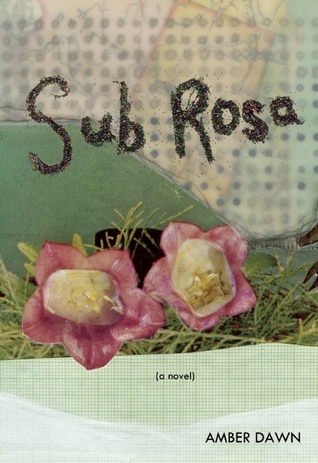 Sub Rosa
Sub Rosa
by Amber Dawn
Arsenal Pulp Press. 316 pages, $19.95
THE TITLE of this haunting first novel by Amber Dawn literally means “beneath the rose,” usually applied to a secret meeting. In this case, Sub Rosa is an actual neighborhood that exists in its own dimension in a city that resembles Vancouver, Canada. It’s a luxurious haven for sex workers who have literally paid their dues by serving an apprenticeship in a dangerous place called “the Dark.”
Even in the real world, the sex trade has a culture of its own. Sexual orientation is fluid in that milieu, where pimps usually have several “wives” apiece and where sex workers have motives both to compete with each other and to stick together. Like the shadowy regulars in gay bars of the 1950’s, sex workers must cope with the disapproval of “straight” society and the constant risk of arrest. Like characters in role-playing games, sex workers base their working personas on their physical characteristics and abilities, and they have single names that their parents never gave them. In this novel, the fog of misunderstanding and invisibility that separate the sex trade from the rest of society constitutes a real barrier. The narrator is a teenage runaway called “Little” who crosses the barrier when she is rescued—or abducted—by a charismatic man named Arsen. He is a pimp who shows genuine care for his “wives,” and he has paid some dues of his own. Joining his “family” is the best option available to Little. Little’s mentor in Sub Rosa is a voluptuous woman called Candy. She is Arsen’s “first wife,” whose job it is to train the newer recruits. She explains the vocation of the “Glories,” a community of elegant prostitutes: “Men got no problem sexin’ a girl who hates ’em, then tossin’ her away after. Plenty of men visit the skids and do just that. But a Glory … can turn these devils good again. We get right inside them and pull out their deepest wants. We become more than sex, we nurse their deepest insides, the parts that aren’t covered in city filth.” And the benefits are huge: “and since we do this, we never have to be ill-treated no more. We get everythin’ we want. Sub Rosa never dries up. Its wealth is endless, and it’s all for us. Glories rule Sub Rosa, you’ll see, Little. Soon you’ll have everythin’ you ever wanted.” The Glories even have magical powers. Soon after her debut—a big party like the coming-out cotillion of a 19th-century socialite—Little discovers that she has a phantom third hand that she can learn to control. The hand seems to be connected to her new ring, a black pearl that was assigned to her. This jewel, in turn, seems somehow connected to the Dark, that place of trauma which causes partial or total amnesia. Is Sub Rosa a utopia or a dystopia? On the surface, it looks like an inviting alternative to “the skids,” yet those who live there have few or no memories of their past lives and no contact with anyone from the outside world except for their customers. Little’s recovery of her real name and her growing desire to claim her past leads to an epiphany: the only way back to reality is to willingly re-enter the Dark. Little becomes an unlikely heroine who leads her companions to their own truths. This novel is both whimsical and profound, the kind of book that could acquire a cult status. Anyone familiar with the sex trade will probably recognize the author’s metaphorical world, and those who have never gone there can find enlightenment of a different kind in Sub Rosa. Jean Roberta is writer based in Regina, Saskatchewan.
________________________________________________________





